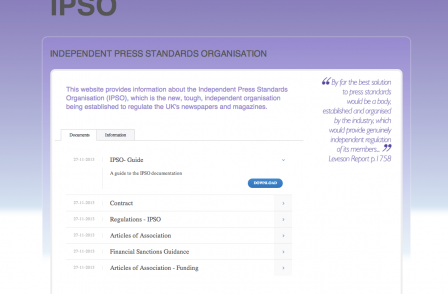
Two of the rebel national publishers who have so far refused to sign up to the Independent Press Standards Organisation have hinted that the choice of chairman for the new regulator could change their thinking.
Most major UK newspaper and magazine publishers have signed up to the new IPSO press regulator which locks members into binding contracts and has the power to levy £1m fines.
But as yet the Lebedev-owned titles (Independent and Evening Standard), Guardian News and Media (GNM) and the Financial Times have all refused to sign up to IPSO. They fear that it will not be sufficiently independent from the industry.
This raises the prospect they will place themselves outside of any press regulation scheme when IPSO is up and running, and the PCC closes down, some time after 1 May.
In response to questions from Press Gazette, The Independent and GNM have said that the choice of chairman for the new regulator will be key.
A five-person panel, headed by former civil servant Sir Hayden Phllips, is currently considering applications for the £150k job of heading up the IPSO board. This appointments panel includes two industry representatives: Times editor John Witherow and former Manchester Evening News editor Paul Horrocks.
Asked whether it will signing up to IPSO, The Guardian told Press Gazette: “Guardian News & Media has not ruled out joining IPSO in the future, but – along with one or two other national papers – has concerns about some aspects of the proposed regulator, which we continue to discuss.”
The Guardian also said it does not support the Royal Charter-backed press regulation system endorsed by 200 prominent UK figures this week, which has cross-party support and is underpinned by legislation.
A GNM spokesperson said: “We have consistently argued for a regulator that is independent of politicians and credible with the public. The Royal Charter is not independent of politicians, and it remains to be seen whether IPSO will be credible to the public.
“The first litmus test of IPSO's credibility will be the nature of the appointments to the IPSO chair and board in the next few weeks. Our overriding concern is to ensure that the Guardian and Observer are subject to an open, independent complaints process that enables readers to gain redress in a timely manner.”
Group content director for the Independent and Standard titles Chris Blackhurst told Press Gazette: “We’ve not signed up [to IPSO] but that doesn’t mean we won’t sign up in the future. The decision over whether to join IPSO lies with the proprietor Evgeny Lebedev.
“Evgeny would like to see who the chairman is. We are broadly supportive of IPSO with one or two caveats.”
Press Gazette also asked the Financial times whether it would be joining IPSO and what (if any) alternative plans it has in place to be part of a press regulation scheme.
A spokesperson said: “The Financial Times is a global print and digital news organisation with a long track record of integrity, independence and ethical journalistic practices, underpinned by a robust code of conduct. We are confident that the FT operates in a manner that is consistent with the spirit of the Leveson report.
"We take the issue of UK press regulation seriously, as we do in any country where the FT is published, and have consistently advocated independent press regulation with strong enforcement powers. We maintain a dialogue with all groups concerned and are reviewing the current proposals.”
A number of other magazine and newspaper publishers currently regulated by the PCC have also yet to sign up to IPSO.
A rival press regulator called Impress is currently trying to persuade publications which have yet to sign up to IPSO to join its alternative scheme. But it may not attract enough members to be viable.
Press Gazette asked campaign group Hacked Off: “Once the PCC closes down, on 1 May or later, do you think it would be better for publications to be in IPSO or not part of any regulator at all?
“Isn’t IPSO far better than nothing when it comes to getting justice for ordinary people who feel badly served by the press in future?”
A spokesperson said: “It would hardly be much of a selling line: 'Our self-regulator is better than nothing.' Especially in an industry found by a public inquiry to have 'wreaked havoc in the lives of innocent people'. When (as Leveson found with the PCC and the Hunt-Black scheme) a system is designed to serve the interests of the targets of complaints rather than rigorously uphold a credible code of practice then nobody should be satisfied – and journalists would denounce such a system if it operated in any other industry.
“IPSO is a confidence trick with the long-term objective of preserving a status quo that has been declared unacceptable by a public inquiry. No newspaper that cares about governance should associate with it, and members of the public would be well advised to give it wide berth. We need self-regulation we can trust, and there is nothing to stop the industry from creating a self-regulator that meets the standards of trust set out in the Leveson Report and the Royal Charter. The test is to seek and receive recognition under the charter. Anything less can't be trusted."
Email pged@pressgazette.co.uk to point out mistakes, provide story tips or send in a letter for publication on our "Letters Page" blog

